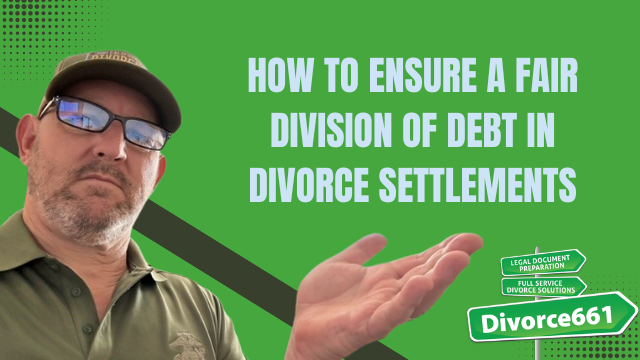How to Ensure a Fair Division of Debt in Divorce Settlements
Divorce can be an overwhelming process, and one of the most critical yet often overlooked aspects is the division of debt. It’s essential to understand how debt is treated in a divorce, especially in California, where community property laws govern most marital assets and liabilities. In this blog, we’ll break down the intricacies of debt division, share real-life examples, and offer valuable insights to help you navigate this challenging terrain.
Understanding Community Debt in California
In California, debts incurred during the marriage are generally considered community property. This means they are typically divided equally between spouses, regardless of whose name is on the account. This includes various forms of debt such as credit cards, car loans, and personal loans.
However, not all debts are treated equally. If one spouse accrues debt after separation or takes out a loan that does not benefit the marriage, that debt may be considered separate. It’s crucial to document the timeline of any debts incurred to ensure a fair division.
When Is Debt Considered Separate?
Debt can be classified as separate if it was incurred after the date of separation. For instance, if one spouse secretly takes out a personal loan after moving out, that debt may not be subject to division during the divorce. We had a case where a spouse took out a personal loan without informing the other partner. Our client documented the timeline effectively, and the court ruled that the debt was separate, meaning our client was not responsible for it.
Real-Life Client Story
Let’s delve deeper into that real client scenario. In this case, one spouse had moved out and subsequently took out a personal loan. The other spouse was concerned about being held liable for this hidden debt. By documenting the timeline of separation and the loan acquisition, we were able to present a compelling case in court. The judge ruled that the debt was solely the responsibility of the spouse who incurred it, providing our client with significant relief and financial protection.
The Importance of Clear Settlement Terms
To avoid future disputes, it’s essential to include clear settlement terms in your divorce agreement. This should outline who is responsible for which debts and include timelines for repayment or refinancing of any joint debts. Without these specifics, couples may find themselves financially tied to their ex-partners long after the divorce has finalized.
Steps to Ensure a Fair Debt Division
Here are some steps you can take to ensure that debts are divided fairly during your divorce:
- List All Debts: Both spouses should create a comprehensive list of all debts, including credit cards, loans, and any other financial obligations.
- Classify Debts: Work with your attorney to classify each debt as community or separate property based on when it was incurred.
- Document Everything: Keep meticulous records of when debts were incurred and any payments made towards them.
- Negotiate Settlement Terms: Ensure your divorce agreement includes clear terms regarding debt responsibility and timelines for repayment.
How to Avoid Staying Financially Tied to Your Ex
Staying financially connected to an ex can create unnecessary complications post-divorce. Here are some strategies to minimize this risk:
- Refinance Joint Debts: If you have joint debts, consider refinancing them solely in one spouse’s name to eliminate shared responsibility.
- Pay Off Joint Accounts: Aim to pay off any joint accounts before finalizing the divorce to avoid lingering obligations.
- Include Clear Terms in Your Agreement: Your divorce settlement should clearly state how joint debts will be handled and provide timelines for any necessary refinancing.
Consulting a Divorce Professional
Navigating the complexities of debt division can be daunting. Consulting with a divorce professional can provide clarity and guidance tailored to your situation. At Divorce661, we assist clients in listing all debts during financial disclosures and drafting enforceable settlement terms to avoid future disputes.
Why Choose Divorce661?
Choosing Divorce661 means you’ll benefit from:
- Expert guidance every step of the way.
- Flat-fee divorce services, making it easier to budget for your legal expenses.
- A commitment to ensuring your financial interests are protected during the divorce process.
Get Started with a Free Consultation
If you’re going through a divorce and want to ensure debts are divided fairly and legally, contact us for a free consultation. We’re here to help you protect your credit and ensure everything is handled correctly.
Conclusion
Dividing debt during a divorce can be complicated, but understanding the nuances of community property laws and being proactive can make a significant difference. By documenting debts, negotiating clear settlement terms, and consulting with professionals, you can navigate this challenging process more effectively. Remember, you don’t have to face this alone—seek help to safeguard your financial future.
Have questions or concerns about your divorce and debt division? Comment below, and let us help you find the best path forward!

